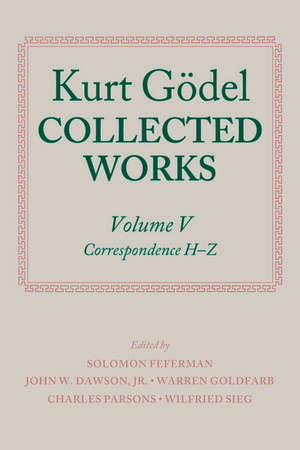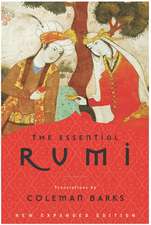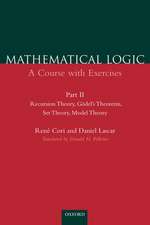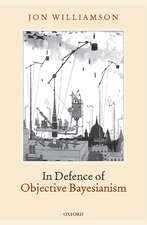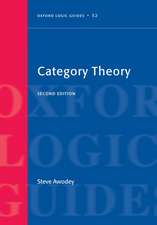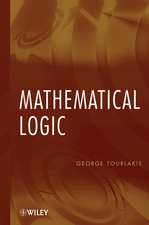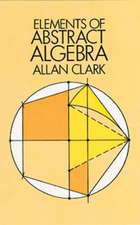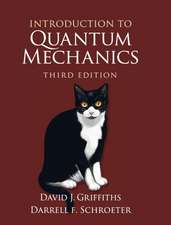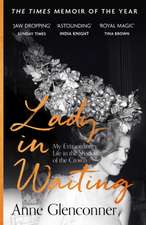Kurt Gödel: Collected Works: Volume V
Autor Kurt Gödel Editat de Solomon Feferman, John W. Dawson Jr, Warren Goldfarb, Charles Parsons, Wilfried Siegen Limba Engleză Paperback – 9 ian 2014
| Toate formatele și edițiile | Preț | Express |
|---|---|---|
| Paperback (4) | 460.61 lei 31-38 zile | |
| OUP OXFORD – 28 iun 2001 | 460.61 lei 31-38 zile | |
| OUP OXFORD – 9 ian 2014 | 482.74 lei 31-38 zile | |
| OUP OXFORD – 9 ian 2014 | 566.22 lei 31-38 zile | |
| OUP OXFORD – 16 aug 2001 | 594.05 lei 31-38 zile | |
| Hardback (4) | 1639.82 lei 31-38 zile | |
| Oxford University Press – 5 apr 1990 | 1639.82 lei 31-38 zile | |
| Oxford University Press – 22 mai 1986 | 1641.86 lei 31-38 zile | |
| OUP OXFORD – 27 mar 2003 | 1806.68 lei 31-38 zile | |
| Oxford University Press – 25 mai 1995 | 1835.01 lei 31-38 zile |
Preț: 566.22 lei
Preț vechi: 679.06 lei
-17% Nou
Puncte Express: 849
Preț estimativ în valută:
108.35€ • 115.86$ • 90.34£
108.35€ • 115.86$ • 90.34£
Carte tipărită la comandă
Livrare economică 07-14 aprilie
Preluare comenzi: 021 569.72.76
Specificații
ISBN-13: 9780199689620
ISBN-10: 0199689628
Pagini: 692
Dimensiuni: 156 x 231 x 38 mm
Greutate: 1.01 kg
Editura: OUP OXFORD
Colecția OUP Oxford
Locul publicării:Oxford, United Kingdom
ISBN-10: 0199689628
Pagini: 692
Dimensiuni: 156 x 231 x 38 mm
Greutate: 1.01 kg
Editura: OUP OXFORD
Colecția OUP Oxford
Locul publicării:Oxford, United Kingdom
Recenzii
Review from other book by this author Gödel would probably have been pleased ... The set should be of interest to professionals and students in the area of logic, mathematics, phiosophy, history of science, computer science and to some non-specialists with a background in science and/or logic. For all university level libraries and for large public and college library collections.
This book (Volume I) is unique, and every philosopher or historian of logic will be determined to possess it.
This is the second volume of this impressive series of Gödel's works ... this second volume of his published works is really fundamental, as it was only in this period that Godel decided to make public some traits of his philosophical position ... The introductory note to these writings, by R. Solovay, seems to me historically and technically superb. I congratulate the editorial team for including in this volume the improved 1972 version of the Dialectica paper of 1958 on finitary mathematics ... As a whole, the book is absolutely indispensable for anyone interested in Gödel's ideas, or generally on the history and philosophy of logic and mathematics.
These volumes contain, as well as the doctoral dissertation and a hitherto unpublished revision of a translation of the Dialectica paper, all of Gödel's work printed in his lifetime. The volumes are meticulously edited and are a pleasure to consult. Original page numbers are clearly shown; papers written in German are printed with facing translations.
Anyone interested in the life and work of Kurt Gödel, or in the history of mathematical logic in this century, is indebted to all of the contributors to this volume (volume I)for the care with which they have presented Gödel's work. They have succeeded in using their own expertise to elucidate both the nature and the significance of what Gödel and, in turn, mathematical logic have accomplished. From the example of this first volume, the edition promises to be a model of its kind; virtually nothing could be bettered. Feferman and his team are to be congratulated on the care, sureness of touch, and scholarly accuracy with which they have carried out their task.
It is a fascinating and enduringly important collection, superbly well-edited, each paper being prefaced with an excellent intoduction providing background information, summaries of the arguments and, where necessary, criticisms of the views expressed. The editors are to be wholeheartedly congratulated on bringing to the public work which deserves careful study and which ought to do something to revitalise the philosophy of mathematics by presenting a point of view that, unusually, combines intellectual rigour with a willingness to make bold and metaphysical claims.
(For Volume III) This is the third volume of a comprehensive and critical edition of the works of Kurt Gödel. . .All these essays and lectures are most carefully written and remarkably rich. They give considerable insight into Gödel's own achievements in logic, set theory and physics and also into his philosophical views. . . .This volume was a desideratum for a long time. We also hope very strongly that volume 3 is not the last volume.
The book (Volume III) ... will certainly enlarge our appreciation of Gödel's scientific and philosophical thought as well as our understanding of his motivations.
Each item in the volume (Volume III) carries an introduction written by a leading expert, and there are detailed textual notes at the end of the book. The editorial standards are extremely high throughout.
The publication of five volumes of Gödel's Collected Works is doubtlessly a marvellous achievement.
The editors did an excellent job! ... The five volumes of Gödel's Collected Works, being the best way of honouring Gödel, will certainly serve all researchers interested in the field of mathematical logic and the foundations of mathematics as well as the philosophy of mathematics and history of logic.
This book (Volume I) is unique, and every philosopher or historian of logic will be determined to possess it.
This is the second volume of this impressive series of Gödel's works ... this second volume of his published works is really fundamental, as it was only in this period that Godel decided to make public some traits of his philosophical position ... The introductory note to these writings, by R. Solovay, seems to me historically and technically superb. I congratulate the editorial team for including in this volume the improved 1972 version of the Dialectica paper of 1958 on finitary mathematics ... As a whole, the book is absolutely indispensable for anyone interested in Gödel's ideas, or generally on the history and philosophy of logic and mathematics.
These volumes contain, as well as the doctoral dissertation and a hitherto unpublished revision of a translation of the Dialectica paper, all of Gödel's work printed in his lifetime. The volumes are meticulously edited and are a pleasure to consult. Original page numbers are clearly shown; papers written in German are printed with facing translations.
Anyone interested in the life and work of Kurt Gödel, or in the history of mathematical logic in this century, is indebted to all of the contributors to this volume (volume I)for the care with which they have presented Gödel's work. They have succeeded in using their own expertise to elucidate both the nature and the significance of what Gödel and, in turn, mathematical logic have accomplished. From the example of this first volume, the edition promises to be a model of its kind; virtually nothing could be bettered. Feferman and his team are to be congratulated on the care, sureness of touch, and scholarly accuracy with which they have carried out their task.
It is a fascinating and enduringly important collection, superbly well-edited, each paper being prefaced with an excellent intoduction providing background information, summaries of the arguments and, where necessary, criticisms of the views expressed. The editors are to be wholeheartedly congratulated on bringing to the public work which deserves careful study and which ought to do something to revitalise the philosophy of mathematics by presenting a point of view that, unusually, combines intellectual rigour with a willingness to make bold and metaphysical claims.
(For Volume III) This is the third volume of a comprehensive and critical edition of the works of Kurt Gödel. . .All these essays and lectures are most carefully written and remarkably rich. They give considerable insight into Gödel's own achievements in logic, set theory and physics and also into his philosophical views. . . .This volume was a desideratum for a long time. We also hope very strongly that volume 3 is not the last volume.
The book (Volume III) ... will certainly enlarge our appreciation of Gödel's scientific and philosophical thought as well as our understanding of his motivations.
Each item in the volume (Volume III) carries an introduction written by a leading expert, and there are detailed textual notes at the end of the book. The editorial standards are extremely high throughout.
The publication of five volumes of Gödel's Collected Works is doubtlessly a marvellous achievement.
The editors did an excellent job! ... The five volumes of Gödel's Collected Works, being the best way of honouring Gödel, will certainly serve all researchers interested in the field of mathematical logic and the foundations of mathematics as well as the philosophy of mathematics and history of logic.
Notă biografică
Solomon Feferman is Professor of Mathematics and Philosophy at Stanford UniversityJohn W. Dawson Jr is Professor of Mathematics at Penn State York UniversityWarren Goldfarb is Walter Beverly Pearson Professor of Modern Mathematics and Mathematical Logic at Harvard UniversityCharles Parsons is Edgar Pierce Emeritus Professor of Philosophy at Harvard UniversityWilfried Sieg is Patrick Suppes Professor of Philosophy at Carnegie Mellon Unviersity
Cuprins
Gödel 1938: Introductory note to 1938, 1939, 1939a, and 1940 by Robert M. Solovay; The consistency of the axiom of choice and of the generalized continuum hypothesis; Gödel 1939: the consistency of the generalized continuum hypothesis; Gödel 1939a: Consistency proof for the generalized continuum hypothesis; Gödel 1940: the consistency of the axiom of choice and of the generalized continuum hypothesis with the axioms of set theory; Gödel 1944: Introductory note to 1944 by Charles Parsons; Russell's mathematical logic; Gödel 1946: Introductory note to 1946 by Charles Parsons; Remarks before the Princeton bicentennial conference on problems in mathematics; Gödel 1947: Introductory note to 1947 and 1964 by Gregory H. Moore; What is Cantor's continuum problem?; Gödel 1949: Introductory note to 1949 and 1952 by S.W. Hawking; An example of a new type of cosmological solutions of Einstein's field equations of gravitation; Gödel 1949a: Introductory note to 1949a by Howard Stein; A remark about the relationship between relativity theory and idealistic philosophy; Gödel 1952: Rotaoting universes in general relativity theory; Gödel 1958: Introductory note to 1958 and 1972 by A.S. Troelstra; Über eine bisher noch nicht benützte Erweiterung des finiten Standpunktes; On a hitherto unutilized extension of the finitary standpoint; Gödel 1962: postscript to Spector 1962; Gödel 1964: What is Cantor's continuum problem? Gödel 1972: On an extension of finitary mathematics which has not yet been used; Gödel 1972a: Introductory note to 1972a by Solomon Feferman, Robert M. Solovay, and Judson C. Webb; Some remarks on the undecidability results; Gödel 1974: Introductory note to 1974 by Jens Erik Fenstad; Remark on non-standard analysis; Textual notes; References.
